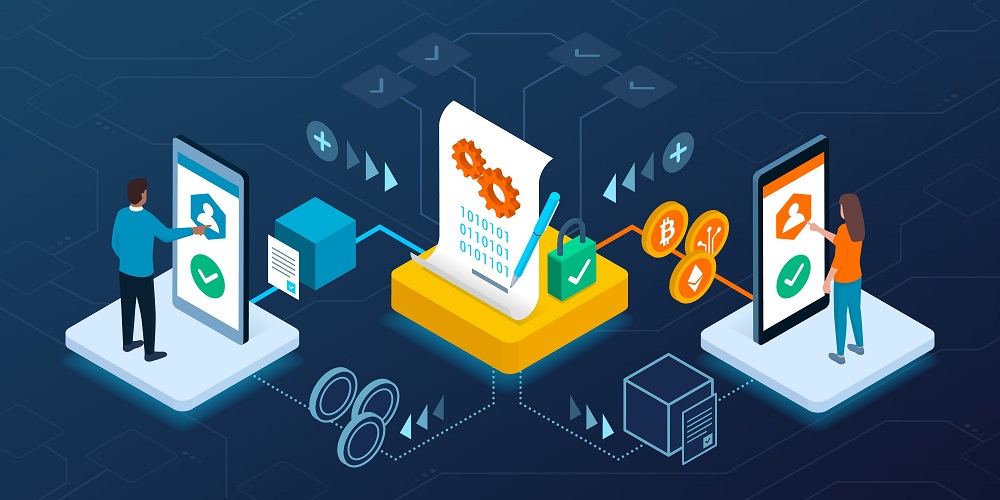Step-by-Step Guide to Smart Contract Auditing
Cryptocurrencies and blockchains have breathed freshness and advancements into the world of finance as well as business across industries. Especially blockchain and the business scopes it has given rise to are extremely transforming how people conduct business.
Blockchain trends have lulled another revolutionizing technology to emerge and grow among enterprises globally. It is smart contract audit development.
A small computer program stored on a blockchain called a Smart Contract. It holds the potential to reduce time and expenses in the transaction process, optimizing them in a better way.
Although some business decision-makers think that the crypto world is standing still, it is not entirely true.
- The cryptocurrency market worldwide will reach $2.2 billion by 2026. (Markets and Markets)
Consequently, the development of dApps, Web 3 apps, and Smart Contract auditing are high on the rise. Blockchain-driven innovative applications continue to create value.
dApps and Web3 apps still handle millions and billions of user funds. In terms of Smart Contract auditing, businesses undergo errors and misguide.
Smart Contracts are the powerhouse of dApps while maintaining safety parameters is a crucial aspect of Web3 development. While code quality dictates whether applications will work as intended, code security dictates the risks of losing locked funds.
It is the sole responsibility of Smart Contract editors to determine and reinforce the security and functionality of Smart Contracts and dApps. Here we will provide a guide to auditing Smart Contracts to show the effortless maintenance of the security of web 3 applications.
What is Smart Contract Audit?
A Smart Contract is a program that is capable of automatically executing the terms of a contract when certain conditions are met. So, it is a computer protocol intended to digitally facilitate, verify, or enforce the negotiation or performance of a contract.
The design of Smart Contracts, including Solana smart contract audit enables the performance of credible transactions without the need for any third parties. It uses distributed ledgers to store the terms of the agreement (hence the blockchain) and uses a cryptographic code to ensure that the contract goes hand in hand with the terms.
Whether Solana Smart Contract or Binance smart chain development, Smart Contracts are getting popular and common among investors and business owners.
On the other hand, a Smart Contract audit process is the review of the program by code developers to resolve bugs and ensure the security of Web 3 apps.
check whether there are any vulnerabilities in the Smart Contract, or code errors. Sometimes, developers become unable to process the audit in effective ways.
Hence, a guide to Smart Contract auditing comes to the surface. After all, an effective Smart Contract code audit can protect users from getting exposed.
Considering the complexity of Smart Contracts and blockchain technology, it is possible for even well-experienced developers also to make mistakes when writing code. It becomes critical to verify correctness using unit testing and automatic tooling verification.
A guide to auditing Smart Contracts ensures a thorough verification process to guarantee the 100% security of the code.
Conventional Smart Contract Attacks

The below list shows the conventional attacks that many Smart contracts go through. Besides the guide to Smart Contract auditing, the awareness of the following attacks will shield developers from conducting mistakes:
- Race Conditions
- Cross-function Race Conditions
- Transaction-Ordering Dependence (TOD) / Front Running
- Timestamp Dependence
- Integer Overflow and Underflow
- DoS with (Unexpected) revert
- DoS with Block Gas Limit
- Forcibly Sending Ether to a Contract
- Deprecated/historical attacks
- Call Depth Attack (deprecated)
Why is Smart Contract Audit Crucial for Businesses?
The prime hindrance to Smart Contract deployment is security issues. Security and inefficiency concerns, to minor programming errors, can lead Smart Contracts to vulnerabilities.
A guide to Smart Contract audit and development will help developers to overcome such vulnerabilities at the very initial stage, increasing the inefficiency of the code.
Following are the significant reasons why Smart Contract auditing or a guide to Smart Contract auditing is crucial for developers and enterprises:
- Code audit in the early development cycle can help you avoid potentially fatal flaws after launch.
- To eliminate spurious results, veteran security auditors manually double-check your code.
- Through rewriting and altering security codes, you can keep an eye on security flaws, preventing security attacks.
- Smart Contract security audit guarantees the security of the decentralized products' ownership.
- A continuous security assessment allows enterprises to improve their development environment.
The guide to Smart Contract auditing shows how the process aids businesses in receiving the vulnerability details and mitigation advice in a vulnerability report.
Additional read: Effective Ways to Ensure Smart Contract Security
A Guide to Smart Contract Auditing

The preparation process in Smart contract code audit is very crucial. An audit will go smoothly if you follow the guide to Smart Contract auditing:
✔️ The Collection of the Models of Code Design
According to the guide to Smart Contract auditing, auditors first need to gather the code specifications and validate the architecture. It will ensure the hassle-free integration of third-party smart contracts. The auditors will attain insight into the goals of the project, determining its scope.
✔️ Running Unit Tests
The next step as per the guide to Smart contract audit process involves testing each unit of the Smart Contract to ensure seamless functioning. Auditors can leverage both manual and automated tools to ensure the unit test cases comprise the Smart Contract's overall coding.
✔️ Choosing the Right Auditing Approach
Smart Contract auditors can reach out to both manual and automated audit processes. Some consider the manual process far more effective than the automated process. While some like to go with automated tools.
✔️ The Initial Report
Once the auditing is complete, auditors need to list down the flaws in the coding along with the feedback so that the development team can work on the errors.
Many Smart Contract development service providers hold in-house auditors who can provide a guide to Smart Contract auditing and help developers to fix bugs in the contracts.
✔️ Publishing the Final Report
Once the bugs get fixed, auditors publish the final report, taking into account any actions made by the project team or external experts to resolve the issues that appeared earlier.
Wrapping up
To conclude, a guide to Smart Contract auditing is crucial to learn the effective ways to process the Smart Contract audit. It helps companies to prevent further loss and customer dissatisfaction.
As Smart Contract audits have become a regular practice for investors and users, it is wise to learn the best way to conduct them.






